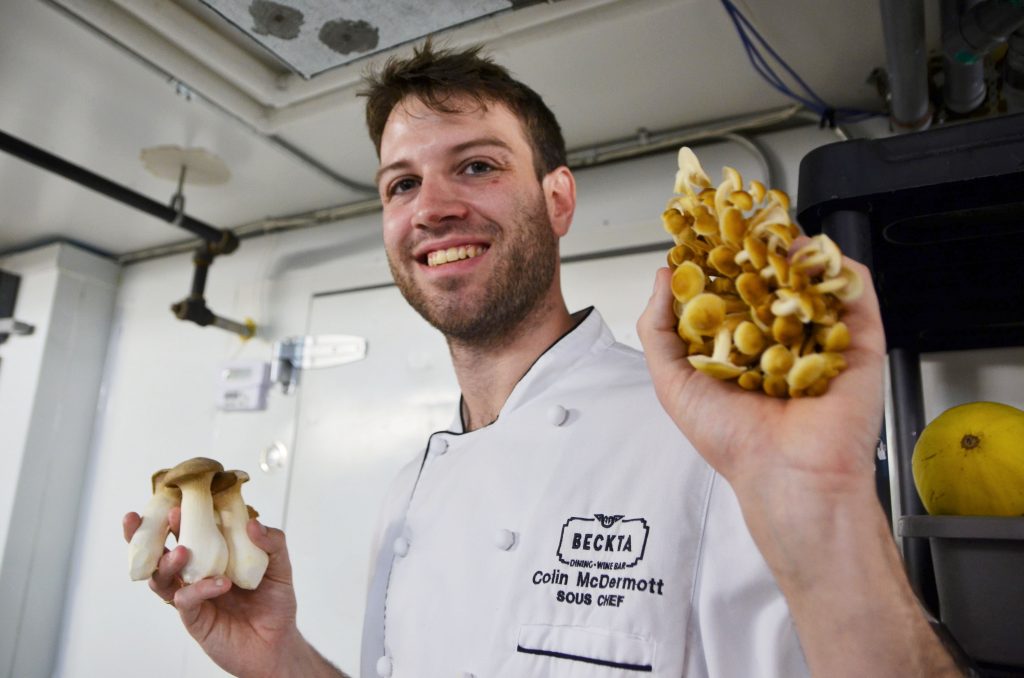Local farm supplies Ottawa’s top restaurants
By Michael MacKinnon
The five Centretown restaurants that recently made Canada’s 100 Best restaurant list share something else in common – their support for local suppliers.
The list was released at the beginning of March, with five downtown restaurants placing between 46th and 75th place: Fairouz, a Middle East-themed restaurant on Somerset Street West, Elgin Street’s Beckta, “molecular gastronomy” specialist Atelier in Little Italy, Bank Street’s Fauna, which offers a “New Canadian” menu, and the stylish Riviera on Sparks Street.
Juniper Farm grows its crops in a field along Chemin Shouldice, just north of Wakefield, about 30 kilometres north of Ottawa.
The farm is owned and cultivated by Alex MacKay-Smith and his wife Juniper. Together, they run a certified organic and “bio-dynamic” farm – a holistic, ecological and ethical approach to farming.
They’ve been running Juniper Farm for the past 11 years. Three years after planting their first crops, Les Fougères, a popular restaurant in nearby Chelsea, approached them with an interest in buying their produce.
“As time went on, I started approaching other chefs, making some new relationships,” said MacKay-Smith. “Soon after that, it just started to escalate quite quickly. Now we’re servicing up to 40 and 50 restaurants in the city.”
That estimate includes all five Ottawa spots on the Canada’s 100 Best list.
Juniper Farm grows 75 different vegetables and multiple varieties of each, allowing restaurants a wide range of choices and the opportunity to cook creatively.
“The big reason why we work with so many restaurants is because I think we realized how much we liked working with the chefs,” said MacKay-Smith.
Much like the top-tier chefs, Alex and Juniper are getting creative with the fruits and vegetables they grow. The couple strives to grow the richest, high-quality food packed with nutrients. Every seed planted, and every vegetable harvested, is treated like a work of art.
“Giving it to these chefs is like giving it to a master artist – especially the best chefs in the city,” said MacKay-Smith. “So you get to see your food transformed into artistry and flavour that goes a tenth fold.”
Maintaining an open dialogue with local growers allows the restaurants to tailor their menus to the freshest and most flavourful ingredients, setting them apart from other restaurants that resort to canned goods if they can’t get a particular product in season.
Like a violinist hearing the difference between a Stradivarius and a Yamaha violin, top chefs can taste the difference between locally grown tomatoes and a canned product.
“These guys are like, ‘Oh you don’t have it, we’re changing the menu’,” said MacKay-Smith.
The relationship goes beyond a shared respect for high-quality food. “All the chefs at those top restaurants are friends of mine. I mean that’s great, it couldn’t be better,” said MacKay-Smith.
Being so heavily involved in the farming process from seed to harvest really benefits the restaurants, according to Clay Cardillo, hospitality director at Beckta, Play Food & Wine, and Gezellig. “They’re actively involved with acknowledging what’s trending, and planting it,” he said.
Orders from Juniper Farm arrive weekly. With produce coming in and out of season, a strong working relationship with the farm allows the restaurants to maintain a standard of freshness with their ingredients.
“We get to know them very well, see what food trends are growing, and work together and work towards that,” said Billy Khoo, chef de cuisine and partner at Fauna.
Khoo said he cooks with ingredients that are available from local suppliers, changing the menu depending on the season.
“For local purposes, for farming purposes, we believe in what they’re doing,” said Khoo.
.

